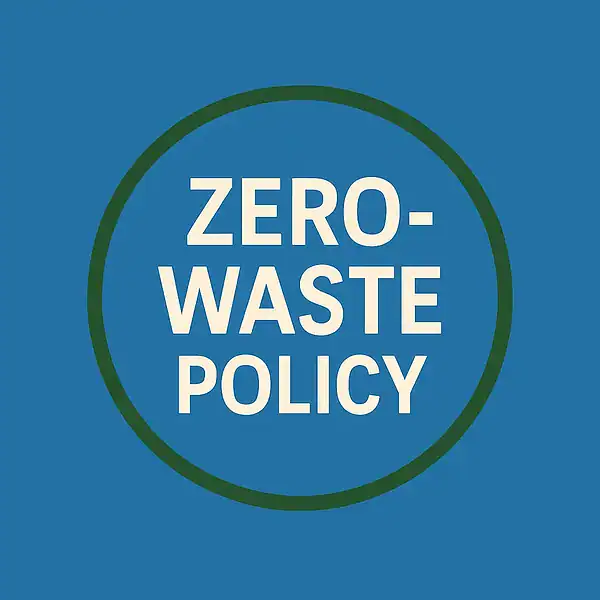A zero-waste policy is a comprehensive approach aimed at eliminating waste by rethinking how materials are produced, consumed and disposed of. Gaining global momentum, it addresses environmental challenges while unlocking economic and community benefits. In Australia, where waste management is an ongoing issue, these policies are increasingly essential.
>Download Now: Free PDF Business Owners Guide To Commingled Recycling Bin Services
What is a Zero-Waste Policy?
A zero-waste policy represents a shift from traditional waste disposal and recycling to eliminating waste entirely by redesigning resource life cycles. The approach builds on the reduce, reuse, recycle hierarchy, with a strong emphasis on prevention.
This strategy views waste as a design flaw and promotes innovation in product development, packaging and operations. By fostering circular systems, zero-waste policies ensure materials remain in use rather than ending up in landfill.
Key Benefits of Implementing a Zero-Waste Policy
Implementing a zero‑waste policy reframes waste from an unavoidable by‑product into a design and management opportunity. By prioritising avoidance, reuse and high‑value recovery over disposal, organisations reduce resource consumption and emissions while improving day‑to‑day efficiency.
The payoff is threefold: measurable environmental gains, immediate and ongoing economic value and broader social benefits –including healthier communities and stronger stakeholder trust. The sections below outline these advantages in turn: environmental, economic and social/community.
Environmental Benefits
Zero-waste policy strategies reduce landfill use and methane emissions – landfills contribute about 17% of Australia’s methane output. Conserving raw materials through reuse and recycling decreases the environmental toll of extraction, processing and transport.
Cleaner production processes also mean less water and air pollution. Reducing landfill leachate protects groundwater, and lower manufacturing demand cuts industrial emissions.
Prioritising avoidance and reuse reduces demand for virgin extraction, protecting habitats and biodiversity. Recycling and remanufacturing typically use far less energy and water than producing goods from raw inputs.
Diverting organics to composting or anaerobic digestion prevents methane while returning nutrients to soils. Better product design also removes hazardous substances at source.
Economic Benefits
Organisations often see immediate cost savings from lower waste disposal fees and reduced collection costs. Improved material usage through reuse and strategic procurement lowers raw material expenses.
Operational efficiency also improves. Evaluating processes through a zero-waste lens often reveals wasteful practices, helping businesses streamline workflows and boost productivity.
Segregated materials create revenue streams and reduce haulage frequency, whilst right‑sized bins and on‑site baling cut logistics costs. Smarter procurement – standardised packaging, reusable transit gear, repairable products—lowers total cost of ownership.
Landfill levies and compliance risks decline, and stronger sustainability credentials improve tender scores, customer retention and access to financing or insurance incentives.
Social and Community Benefits
Zero-waste policies improve public health by reducing toxic emissions and landfill-related pollution. They also create jobs in repair, remanufacturing and sustainability consulting, supporting local economies.
Community awareness grows as zero-waste initiatives inspire more sustainable behaviours among residents and stakeholders.
Clear signage, feedback and staff training normalise better habits, reducing litter and contamination in shared spaces. Partnerships with social enterprises enable repair, resale and food‑rescue programmes that support vulnerable groups.
Public reporting and volunteer events build trust and pride, while cleaner streetscapes and quieter collections enhance amenity for neighbours and visitors.
How to Successfully Implement a Zero-Waste Policy
Effective implementation starts with a thorough waste audit to identify key waste streams, volumes and costs. This data forms the basis for setting goals and measuring progress.
Engage stakeholders – including employees, suppliers and the local community – to build buy-in and uncover practical ideas. Training staff and providing regular updates maintain momentum and consistency.
Set measurable, realistic goals with clear timelines. Use digital tools to track waste streams and monitor outcomes. Collaborating with experienced waste management professionals can streamline the process and tailor strategies to your operations.
Start small with pilots targeting high‑impact streams, then scale what works. Assign clear ownership, set monthly checkpoints and use simple dashboards to track weights, contamination and avoided costs.
Update procurement specs to favour reusable or recycled options, add supplier take‑back clauses, refresh signage regularly and recognise teams for measurable improvements.
Challenges and Solutions in Implementing Zero-Waste Policies
Upfront costs for new systems and equipment can be high, but quick wins like reduced disposal fees often generate immediate savings that fund further improvements.
Resistance to change is common. Counter it with clear communication, inclusive planning and visible leadership support. Highlighting early successes helps shift mindsets.
Operational complexity may slow implementation, especially across diverse waste streams or regulatory landscapes. Begin with high-impact, low-complexity changes and seek expert support to handle bigger challenges.
External cooperation from suppliers and customers may be necessary. Build partnerships through transparent communication and mutual benefit.
Conclusion: Why Adopting a Zero-Waste Policy Matters Today
Zero-waste policies tackle today’s urgent environmental and economic challenges by cutting emissions, conserving resources, lowering costs and improving community wellbeing.
With climate concerns and waste issues intensifying, there’s no better time for Australian businesses and communities to embrace sustainable practices. Though it requires commitment, the long-term rewards are clear.
Ready to start? Waster offers full-service waste management – including recycling, composting and efficient bin collection – to help you implement a zero-waste policy that benefits both the planet and your bottom line.
Contacting Waster
Looking for a specific bin service? Check out our waste recycling shop and find the best deals in terms of pricing and services.
Also, please call 1300 WASTER (1300 927 837) or email us at enquiries@waster.com.au if you have any further questions.


